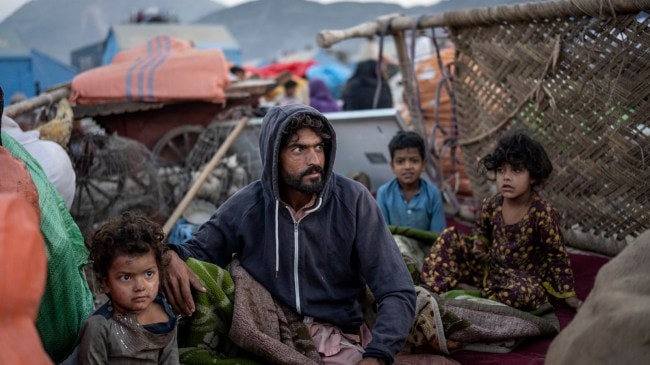Opinion View from Pakistan: A call to protect journalists and a hard deadline for Afghan refugees
A weekly wrap-up of the issues being discussed and debated in India’s neighbourhood
 Pakistan did not budge from its October 31 deadline for “illegal” immigrants — with 1.7 million Afghan immigrants and others being forced out of the country. (AP)
Pakistan did not budge from its October 31 deadline for “illegal” immigrants — with 1.7 million Afghan immigrants and others being forced out of the country. (AP) Protect journalists
On the occasion of International Day to End Impunity for Crimes against Journalists, which falls on November 2 every year, News International (November 2) speaks up against the killing of journalists in the Israel-Palestine conflict. Dawn (November 3) recounts the heartbreaking moment when Al Jazeera reporter Wael al-Dahdouh discovered that his wife, son, daughter and other family members had been killed in an Israeli raid while he was on air. Both editorials note that since October 7, at least 30 journalists have lost their lives in Gaza — with no one held responsible for it.
Dawn (November 3) says, “While statements are important, global media bodies and civil society in the West particularly must pressure their governments to call for an immediate ceasefire, and hold Israel to account for its atrocities against civilians, including journalists and aid workers. Claims by states to respect media freedom will ring hollow until those responsible for forever silencing the voices of Palestinian journalists are brought to justice.”
News International points to the increasing stifling of the media in India saying, “the Modi government… sees reports on its competence as an attack and responds with vengeance.” Advocating for freedom of the press, the editorial states, “A free press is vital to the healthy functioning of any democracy… The task for journalists now is to carve out a space for themselves where they can continue their job of holding the powerful accountable and informing the public. But they cannot do this while fielding airstrikes, or state violence, or arbitrary arrests, or enforced disappearances.”
Development vs climate
At the second Pakistan Climate Conference, caretaker Finance Minister Shamshad Akhtar revealed the trade-off between raising funds for climate initiatives and advancing development. It seems the nation will require $340 billion between 2023 and 2030 to address both challenges or it will be unable to keep its commitment to the Paris Agreement.
Express Tribune (November 5) says, “The heart of the challenge lies in securing funding without compromising essential development finance requirements… In navigating this financial challenge, Pakistan should also look to explore domestic financing avenues and invest sustainable measures that intertwine both resilience and development.” Tribune adds that this conundrum “extends to the international stage” because Pakistan is currently “both climate-vulnerable and debt-distressed”. Dawn(November 4) agrees with this assessment saying, “Dr Akhtar’s sobering assessment calls for innovative solutions, unwavering international cooperation, and an indomitable commitment to securing the funds necessary to confront climate and development challenges in unison… The world must heed this urgent call, recognising that the challenges facing Pakistan are not isolated…”
Poll dates announced
The Election Commission of Pakistan (ECP) has announced the date for the next general elections, which will be held on February 8, 2024. All stakeholders, including political parties and the media welcomed this decision.
But Express Tribune also acknowledged the political instability caused by the delay in poll dates saying, “it is a foregone conclusion that the bus has been missed and the elections cannot be held within the constitutional stipulated period of 90 days. This is for the second time in the last 19 months that organs of the state had shied away from discharging their responsibility of conducting elections.”
News International (November 3) says, “It must be welcomed despite the circumstances surrounding the delay in polls. Pakistan has seen enough political uncertainty and chaos to last it a lifetime but we have seen how such cycles repeat themselves quite often.”
Sliding Rupee
The value of the Pakistani Rupee has decreased significantly against the US Dollar, raising worry in the economy department. In August 2022, the rate of the Rupee was at 218.38 against the dollar but it has faced an increase of about 27 per cent, or about Rs 82, since then. Within the first 11 days of the caretaker government coming in, the currency was devalued by 4 per cent, or Rs 11.73. But the hope is that the Rupee will stabilise between Rs 295 – 305 for now.
The Nation (November 2) says, “The currency depreciation has far-reaching consequences. Pakistan’s status as a major importer of petroleum oil and food products is of concern. The unrelenting depreciation threatens to maintain high inflation rates and hinder economic growth.”
But Daily Times (November 3) remains optimistic since the State Bank of Pakistan (SBP) decided to retain the interest rate at 22 per cent for the next two months. According to the editorial, “the silver lining lies in the expectation that inflation could ease due to more favourable prices for essential food items and other promising economic fundamentals. The global oil market’s unpredictable nature and the lingering effects of gas price fluctuations might still pose some risks to the inflation outlook.”
Deportation of Afghan refugees
Pakistan did not budge from its October 31 deadline for “illegal” immigrants — with 1.7 million Afghan immigrants and others being forced out of the country. This deadline was decided one month ago, giving people that much time to pack up their belongings and lives, which for some, have spanned generations. Each family was allowed to take with them a sum total of PKR 50,000.
Dawn (November 1) says, “Condemnation, criticism and concern from both within the country and abroad have fallen on deaf ears. What will happen to the millions of Afghans who sought shelter in a country they had come to call home for decades?”
Even in terms of the economic considerations, the editorial observes, “The state, in its zeal to safeguard security interests, seems to have overlooked the significant economic ramifications of such an abrupt exit… The deportation of Afghans will also likely further strain relations with Afghanistan and impact regional connectivity.”
The Nation (November 4), however, comments on the launch of the third phase of Allama Iqbal scholarships for Afghan students, which it believes “stands as a promise that long-term cooperation between Pakistan and Afghanistan will not be compromised” even as Afghans are deported in large numbers from Pakistan. Afghan students have been pursuing their education in Pakistan as there is a lack of a formal education system in Afghanistan. The Nation believes “These awards are not only a chance for personal growth for students from Afghanistan but also an asset and value-addition to the human resources of the country.”
adya.goyal@expressindia.com






